Fan Bingbing: One in a Million
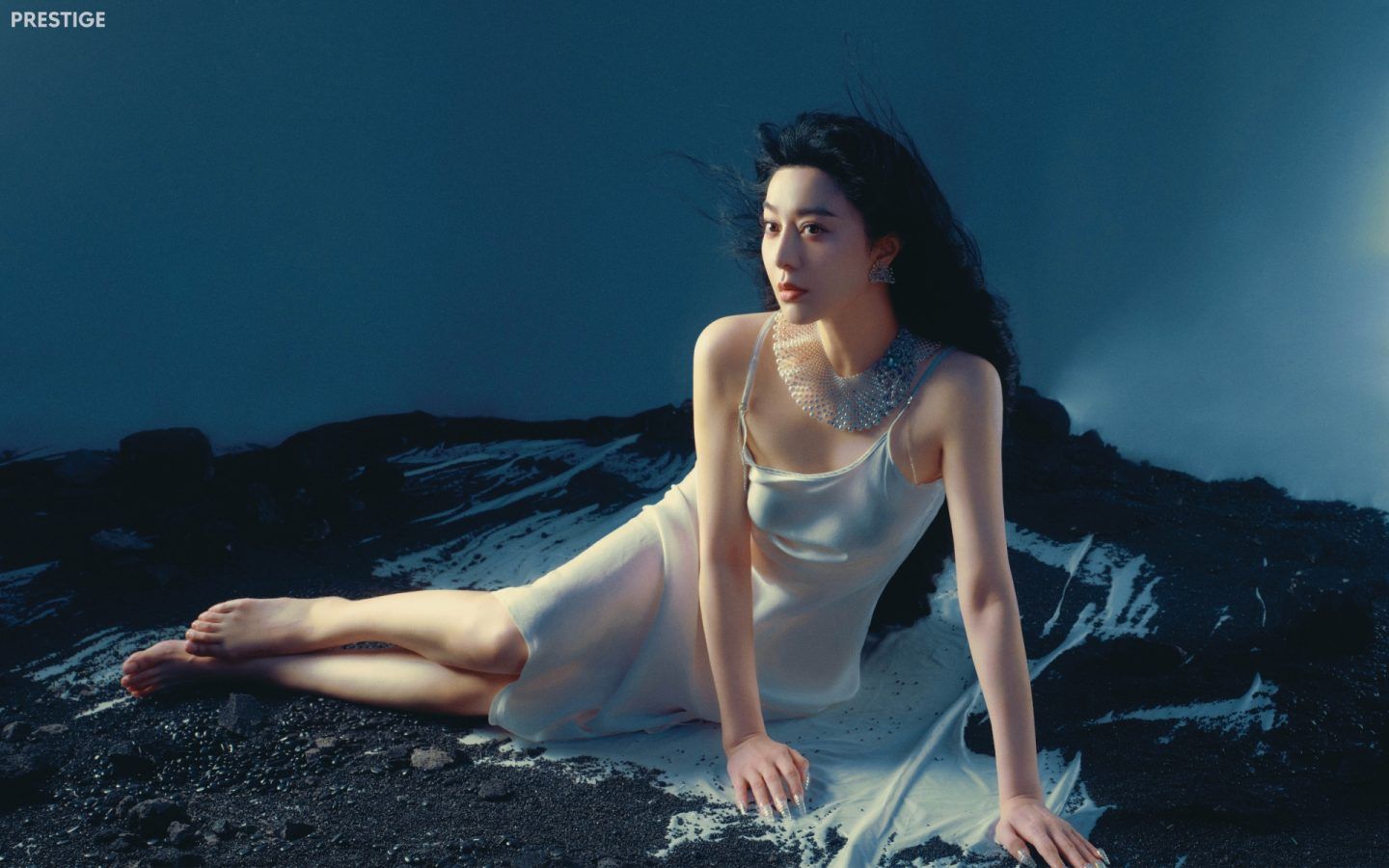

There was never anyone quite like Fan Bingbing before her and, truth be told, there’ll be no one quite like Fan after her.
Photography Issac Lam
Styling Kim Bui Kollar
Art Direction Ip Siu
Assistant Art Director Kumi Tong
Hair Eda Lee
Makeup Bonnie Hu
Manicurist Mei mei Yeung
Project Management Alex Loong
Photography Assistants Jason Li, Kiano
Styling Assistants Anna Lam, Mason Wong
Hair Assistants Eki Ho
Photography Producer Hidi Lee
Art Team Naomi Chui , Karina To, Joan Leung
Gaffer Hsiao, TK, Fei Lung
Production Assistant MK Suen , Alvin Chu
Artist Management Jersey Chong
Before I ever saw Fan Bingbing onscreen, I’d seen her on the red carpet and in the front row of fashion shows. She’s a regular at the Cannes Film Festival, always impeccably dressed in the most exquisite haute couture gowns. Her first red carpet appearance was in 2010, at the 63rd Cannes festival. Fan was virtually unknown internationally at the time, though she was already a huge star in China. She was wearing a dramatic Laurence Hsu one-shoulder couture gown fit for an empress, embroidered with dragons, waves and traditional auspicious clouds on a golden backdrop. Her beauty captivated the world: cameras flashed at lightning speed and publications clamoured to put her on their best-dressed lists. So beloved was the dragon robe that Mattel would later immortalise the look in a Barbie doll, making Fan the first Chinese celebrity to get a Barbie version of herself. Laurence Hsu’s dress was later reproduced for London’s V&A and remains part of its permanent collection, while the original now belongs to Madame Tussaud’s wax museums. It was a moment in history, and the world recognised it.
Fan still relishes every single moment on the red carpet. She tells me, “I love hearing the rapid-fire camera shutters clicking away.”
She knew how to – and loved – to stand out.
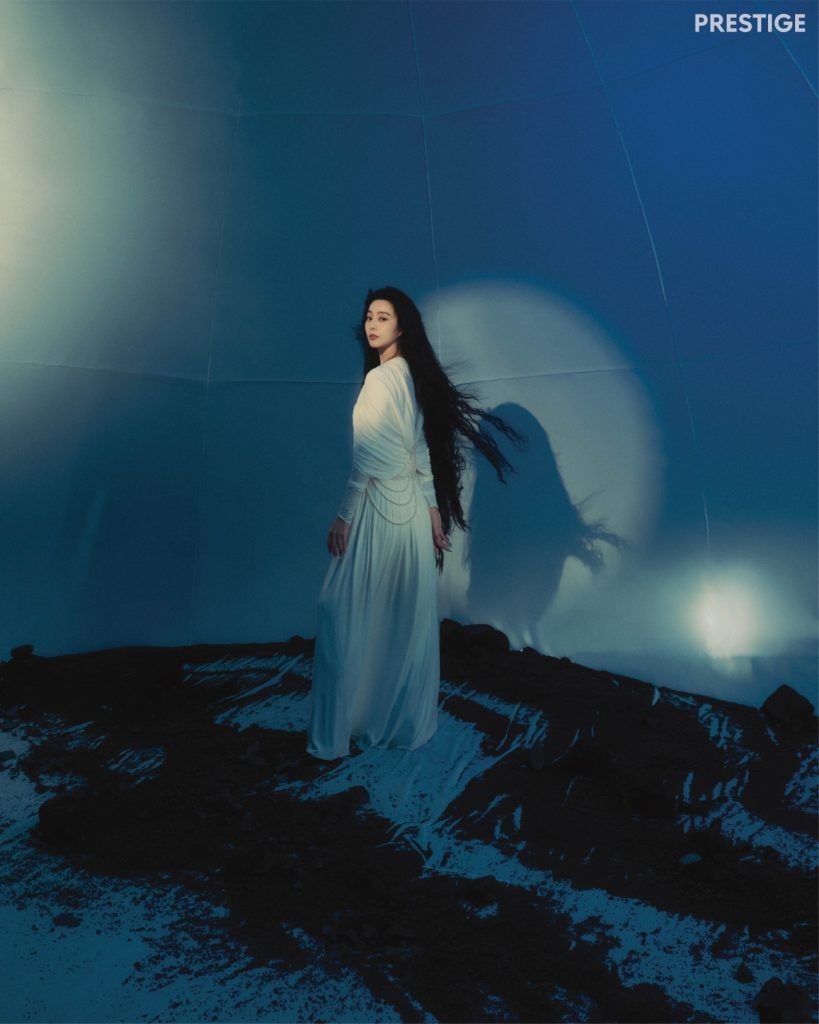
At the age of 12, Fan was already determined to become an actress. She was born in 1981 and raised in Yantai, a port on the Yellow Sea, to a family of performers. Her father was a navy-troupe singer and her mother a dancer. They initially wanted Fan to attend music school and though she had other ideas, she says her parents were always supportive. “I fell in love with acting really early on and I worked really hard to achieve this goal. I just enjoy the feeling of acting.”
She attended Shanghai Xie Jin Star’s School and, after graduation, joined the acclaimed Shanghai Theatre Academy. At 16, she landed a role as a maid in the period television drama My Fair Princess, which turned out to be more than just a promising start for a young and ambitious teenager. The show was an instant hit – it eventually became the most commercially successful Chinese-language series
in history – and Fan became a household name.
A box-office darling, Fan’s work often garnered critical acclaim. She may look like a fairy-tale princess but the roles she picks often reflect the complex and hidden struggles of the contemporary woman. She took risks, which paid off. Her breakout role was, of course, Cell Phone in 2003. She has a knack for working-class roles, such as in Lost in Beijing (2007) and I Am Not Madame Bovary (2016), but she’s equally convincing as a disgruntled youth in Buddha Mountain (2011) or ruling with an iron fist as Wu Zetian in the TV drama The Empress of China (2014). Fan switches easily between roles. “I’ve filmed so many different roles over the years,” she says. “Big or small, they’ve continued to shape me into who I am today.”
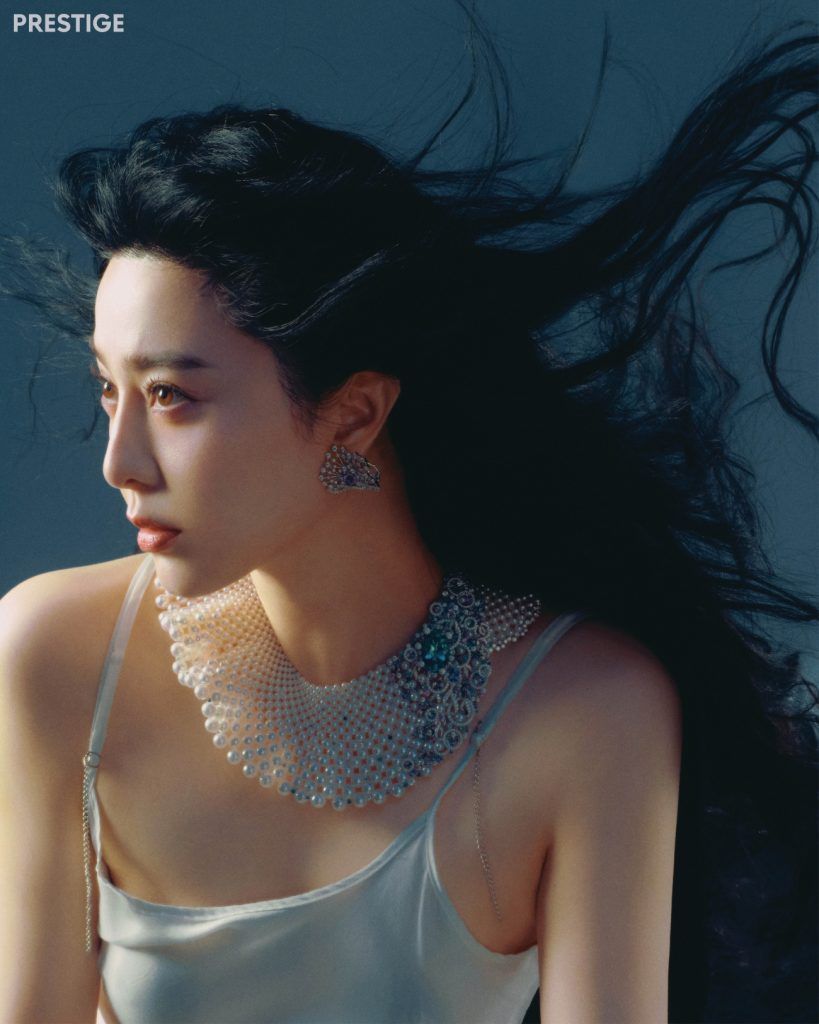
In 2015, Forbes ranked Fan Bingbing as the world’s fifth highest-paid actress, ahead of Julia Roberts and Charlize Theron. Widely respected by the Chinese media, her success and work ethic earned her the nickname Fan Ye (it translates as Master Fan). She was the perfect image of a powerful woman who walked her own path. She didn’t need a man to be rich, famously saying, “I don’t need to marry into a wealthy family. I am my own wealthy family.” And when those envious of her beauty say she’s nothing but a vase, she snaps back: “If I am one, it’s a precious one, which can’t be put just anywhere.”
Her fame soon piqued the interest of Hollywood producers, who were keen to commission Fan for minor roles and cameos. Disney had commissioned then cut Fan from a scene in Iron Man 3, but she’d later appear in Fox’s X-Men: Days of Future Past as teleporting mutant Blink (she had only one line, but her fight scenes were extremely cool). Small as these initial roles were, she soon landed a part in The 355, an international spy movie with an ensemble cast including Jessica Chastain, Penélope Cruz, Diane Kruger and Lupita Nyong’o. It was all set to be a major moment for Fan, who one year earlier, in 2017, expressed a desire to land a leading role in a Hollywood production within 10 years. The 355, which was filmed in Paris and London between June and September 2018, beat all her expectations.
The stars were aligned – and then they weren’t.

The story of Fan’s fall from grace has been widely covered, with any reports on the star after 2018 talking of little else. Shortly before the release of Cell Phone 2, in which she plays a television host’s mistress, she was accused of tax evasion after contracts reporting different salaries were leaked online. The allegations toppled Fan from her pedestal – projects ground to a halt, brand deals fell through and she was slapped with a hefty fine. The reverberations of the scandal would impact not just Fan, but the entire Chinese film industry, as other stars, fearful of a similar fate, disclosed their earnings and the government laid down new rules that would cap a celebrity’s salary to 40 percent of a film’s total budget.
Months later, Fan broke her silence and expressed her remorse in a public statement. When her detention ended, she was quoted as saying she’d have been nothing “without the party and the state’s good policies”. After she laid low for several years, the media began writing about Fan’s cinematic comeback; and after further delays due to Covid, The 355 eventually premiered in 2022. Another film, the Sean McNamara-directed fantasy The King’s Daughter, in which she played a mermaid, also premiered. And as Fan resurfaced, so too did questions about her years in the dark.
But these days, Fan guards her own image closely and is understandably careful with her words. The media’s many attempts to pry her deepest secrets from her have often led nowhere, with rigorously scripted answers about her past. “No one’s life will always be smooth sailing,” is her favourite reply. If she refuses to dwell on her past, nor should we.
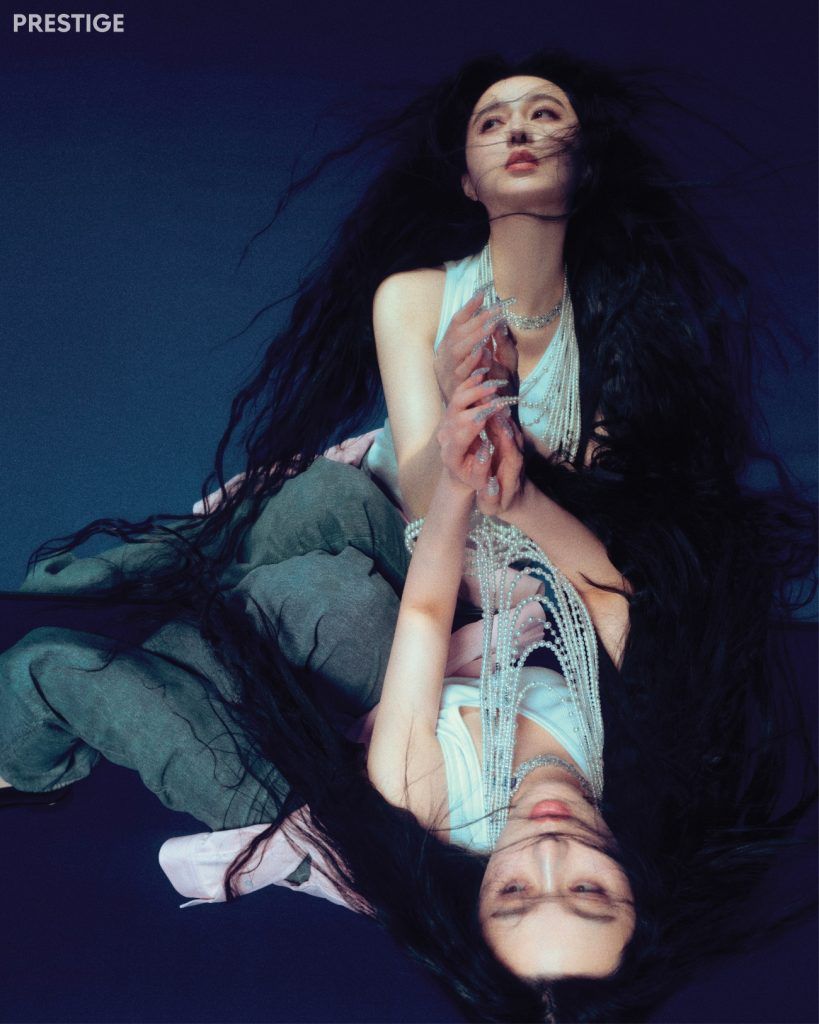
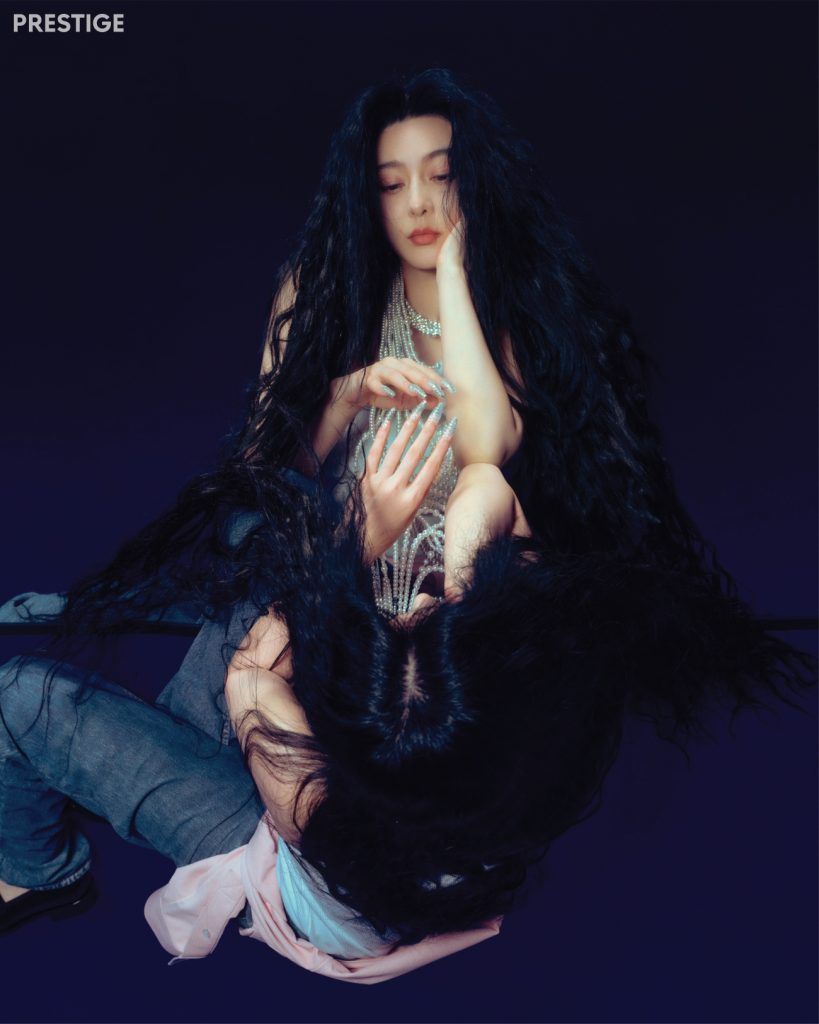
But if we’re inclined to think Fan was leading a quiet life during her hiatus from making movies, we’d be mistaken. Long before the word influencer entered the lexicon, Fan Bingbing was already one. Whatever she did, people followed.
With her porcelain skin, almond-shaped face, large doe eyes and jet-black hair that tumbles to her waist, Fan Bingbing is a vision of beauty – everyone wants to look like her and be like her, which a quick scroll through Chinese social media platforms only confirms. Her beauty was untouchable and couldn’t be denied, even in the aftermath of scandal. She’s known for her good looks and her high maintenance upkeep. It’s reported that she uses two masks a day, one for moisturising and the other for whitening, and that she goes through 600 sheet masks a year. At the height of her career, an e-commerce website crashed after she posted about a face mask she liked.
Fan is also a smart businesswoman, and therein lay an opportunity to further extend her reach. “I have a lot of opinions about skincare and I love sharing my experiences with my viewers so they can take better care of themselves,” she says. She set up Fan Beauty in 2018, a beauty line sold solely through e-commerce. Those questioning whether the brand was capitalising on Fan Bingbing’s popularity without delivering genuine quality were soon quashed: the brand thrived and established a loyal customer base.
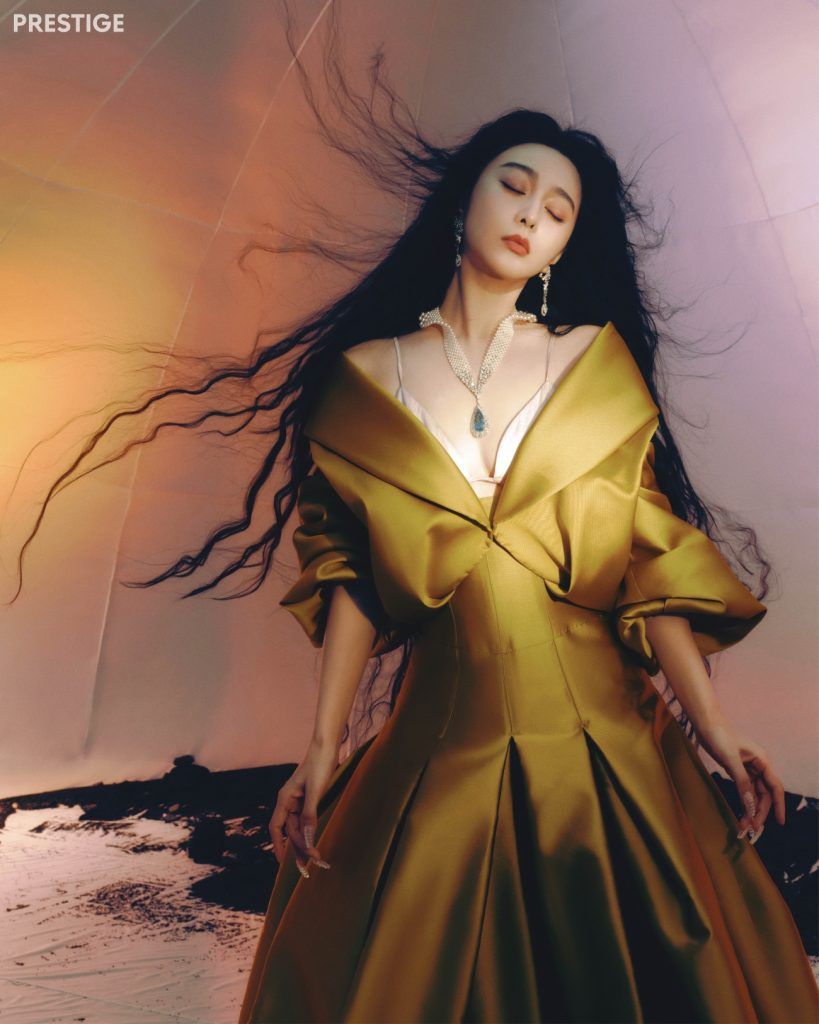
“I’m deeply involved in the research and development process of all my products, because I insist on trying them all myself,” Fan reveals. “I only recommend products to our customers if I’ve personally found no issues with them. This makes my customers feel at ease. Our products are selling well. The most popular item is probably still the Seagrape Hydrating Mask, because the moisturising effect is one of the best on the market.
“After all,” Fan says, laughing, “I can claim this because I’m the one who’s tried out every single type of sheet masks.” Before her work trips her colleagues often pack her bags to the brim with tester products: in August, Fan shared a behind-the-scenes clip on Little Red Book of a long table covered with beauty products. “Look at how much my team packed for me,” she says, slightly shocked, in the video. “I’m only away for 10 days!”
Evidently, she’s back in the swing of things.


Early this year, Fan Bingbing made headlines after appearing at the Berlin International Film Festival to promote her new film, Green Night. In the high-octane chase thriller directed by Han Shuai, she plays an exploited Chinese migrant worker who finds herself embroiled in crime, violence and death in Seoul’s dark underworld. Fan co-stars with Korean actress Lee Joo Young and in the movie, has more than a few lines in Korean, which, Fan tells me, “wasn’t too bad a challenge; everyone helped me out a lot”.
On working with Lee, Fan says, “It’s quite comfortable working with her. Obviously we had a bit of a language barrier, but we often relied on body language and understood each other implicitly. It was very memorable shooting with her.”
She often picks projects that speak to her on a deeper level, which is exactly what Green Night’s script did: it was a project she cared about a lot. She tells me that, when it comes to choosing a script, she’ll often look at the bigger picture.
“Green Night is actually a story about leaving,” she tells me. “In the script, our characters strive to live the life they want and it’s about gradually gaining the courage to face all the unknowns. I hope it can give strength to people who are in the same predicament. It was a work that really spoke to me.”
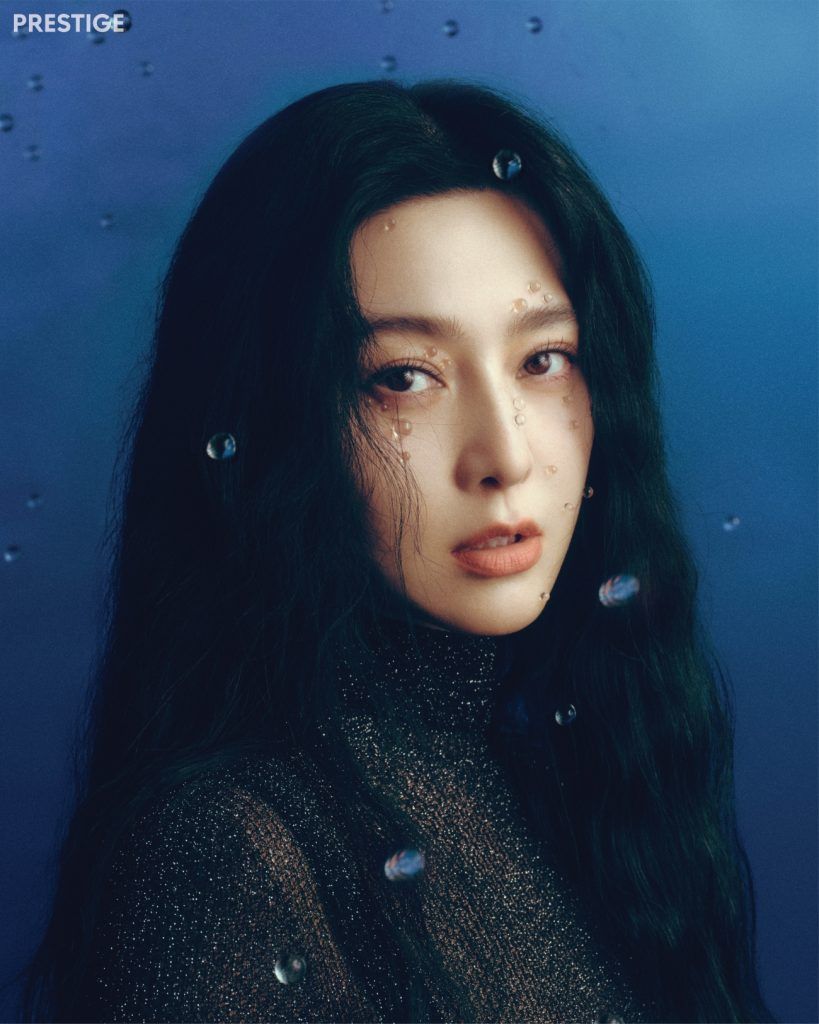
Fan Bingbing was also back on the Oscars champagne-coloured carpet this year, channelling Old Hollywood glamour in a Tony Ward couture gown dripping in crystal embellishments with a cinched waist and a plunging neckline, finished with dramatic green sleeves and a cape. At Cannes this year, she walked the red carpet 16 times. Asking her about her style elicits obvious answers.
“Have you always had a strong sense of fashion?”
“Without question. Wouldn’t you agree?”
“What has been your favourite red carpet look?”
“My next one!”
“Do you think you’ll be a good fashion designer?”
“I think I can be anything I want to be.”
I try a different question. “What are your biggest fears?” “I don’t have any. I believe in myself and I have nothing to fear.”

Fan is back big time, confidence, wit and all. She’s working on new projects that she’s not allowed to share yet, but tells us to look forward to them. “I don’t want to set limits for myself anymore and to keep trying and challenging myself. I’m very interested in getting involved in new things, experiencing new things and going beyond my comfort zone,” she says.
If this is Fan Bingbing’s new era, we’re up for it. “I am me,” she says. “I’m very comfortable in my own skin now, whether as an actor, a business owner or whatever. No matter what my identity is, I know I’m able to make people remember me.”